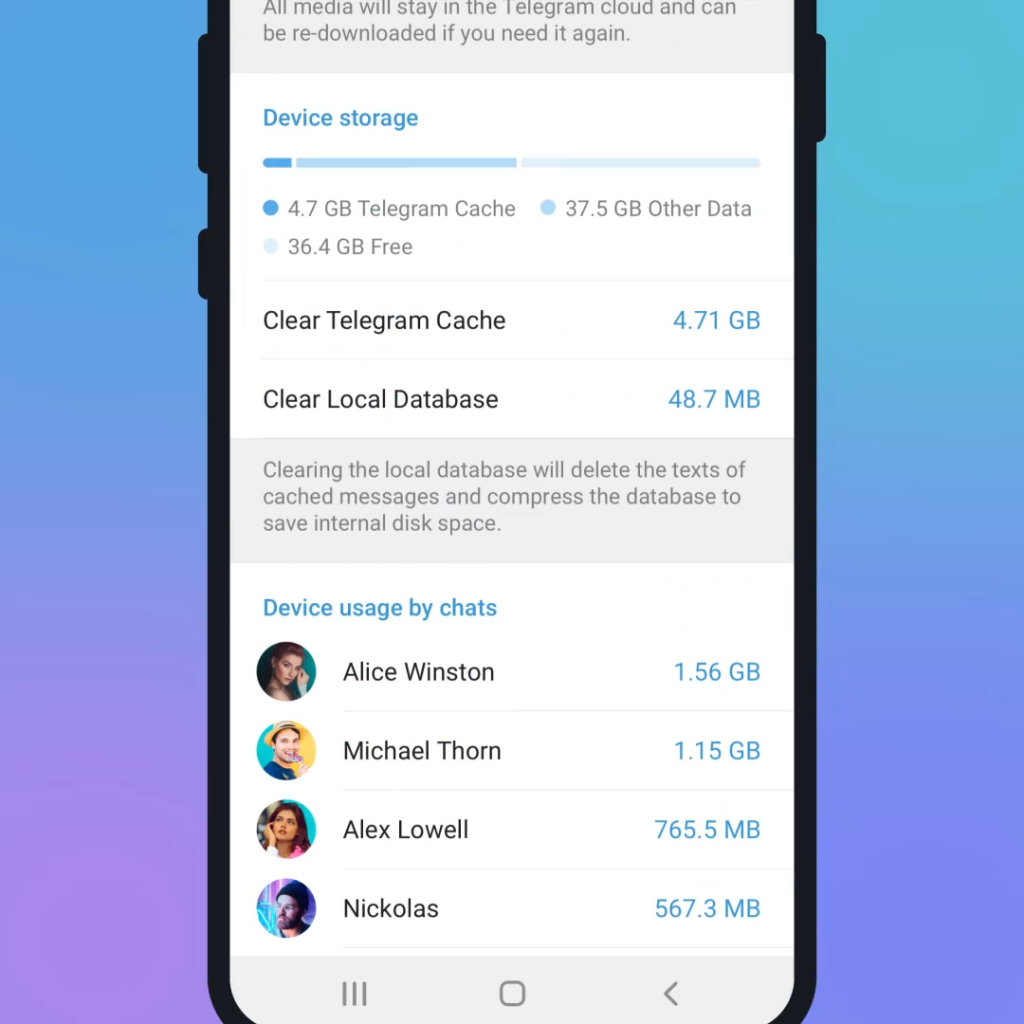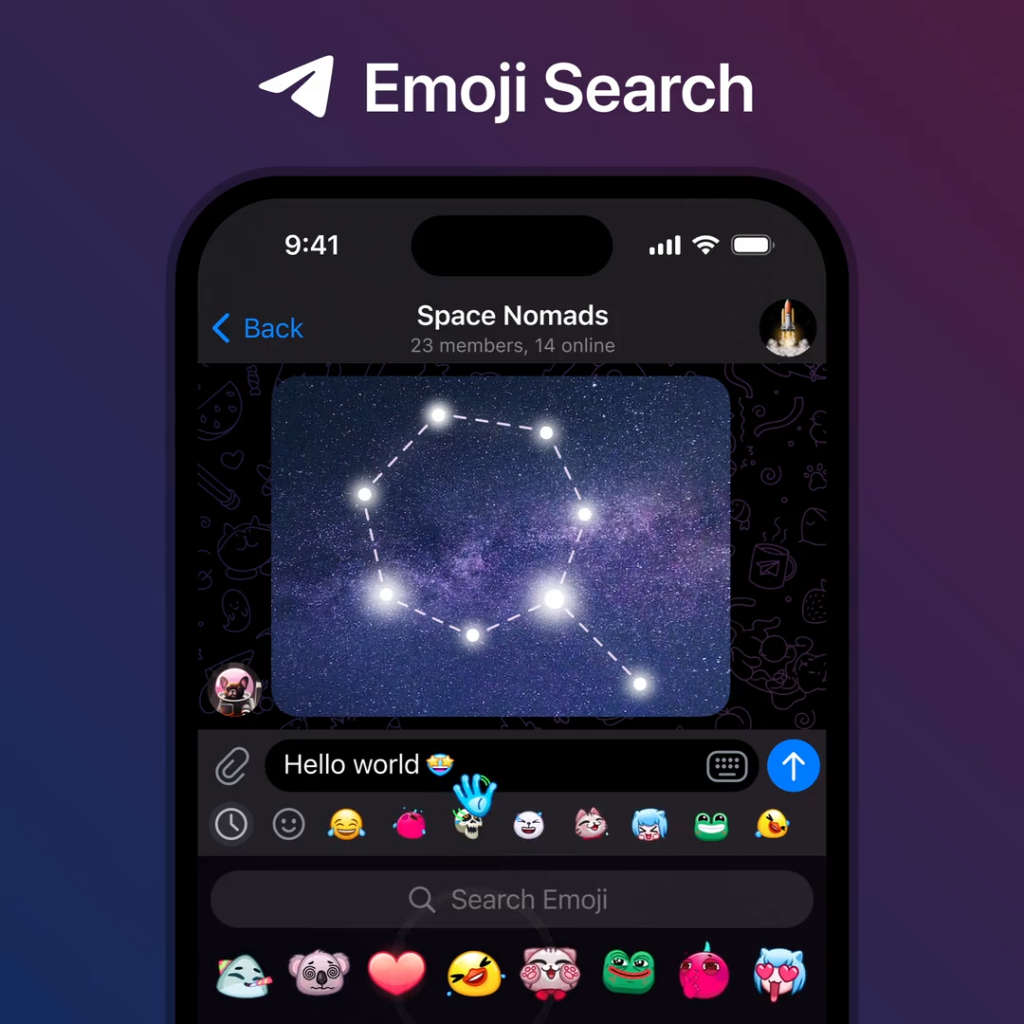
Telegram offers strong privacy features, but it’s not 100% private, especially for regular chats stored on its servers.
Telegram’s Encryption Protocols
End-to-End Encryption for Secret Chats
- Private Messaging: Secret chats are end-to-end encrypted, ensuring only the sender and recipient can read the messages.
- Self-Destructing Messages: Secret chats support messages that automatically delete after a set time.
- Signal Protocol: End-to-end encryption is based on the secure Signal Protocol.
Regular Chats and Cloud-Based Encryption
- Cloud Encryption: Regular chats use server-client encryption, with data stored securely on Telegram’s servers for multi-device syncing.
- Server Access: Telegram can access regular chat data, but encryption keeps it secure during transmission.
- Security Practices: Telegram implements strong security measures to protect data on its servers.

User Privacy Settings on Telegram
Controlling Who Sees Your Information
- Custom Privacy Options: Telegram allows you to control who can view your phone number, profile picture, and other personal details, letting you restrict visibility to only selected users.
- Profile Visibility: You can choose to make your profile visible to everyone, just your contacts, or specific people, offering personalized privacy control.
Managing Last Seen and Profile Visibility
- Last Seen Settings: Telegram lets you control who can see your “Last Seen” status. You can set it to everyone, only contacts, or specific users, or even disable it entirely.
- Profile Picture Visibility: You can also control who can view your profile picture, allowing you to hide it from non-contacts or particular users while keeping it visible to others.

Telegram’s Data Storage and Accessibility
Cloud-Based Storage vs. Local Storage
- Cloud-Based Storage: Telegram stores your messages, media, and files on its secure cloud servers, allowing you to access your data across multiple devices without taking up space on your phone.
- Local Storage: Telegram also allows you to download and store media locally on your device. This gives you control over what is stored on your phone, but it limits access to other devices.
Who Has Access to Your Data?
- Telegram’s Access: While Telegram can access messages stored in its cloud servers (for regular chats), secret chats are not accessible to Telegram as they are end-to-end encrypted.
- Third-Party Access: Telegram claims it does not share user data with third parties unless required by law. However, its privacy policy and data retention practices may vary depending on local regulations.

Telegram’s Stance on Government Surveillance
How Telegram Handles Government Requests
- Privacy-Focused: Telegram has a strict policy against complying with government surveillance requests, emphasizing user privacy and security. It does not provide authorities with encryption keys.
- Limited Data Sharing: Telegram shares minimal user data with governments, only complying with requests in cases of severe criminal activity, and even then, it aims to protect user privacy as much as possible.
Telegram’s Response to Legal Challenges
- Legal Resistance: Telegram has resisted numerous government demands, including attempts by the Russian government to access user data. It has fought legal battles to maintain its commitment to privacy.
- Decentralized Approach: Telegram’s decision to operate from multiple jurisdictions and avoid a centralized headquarters helps it to navigate legal challenges and protect user privacy, particularly in restrictive regions.

The Role of Third-Party Integrations in Privacy
Bots and External Services on Telegram
- Bots for Automation: Telegram allows the use of bots for a variety of tasks like scheduling, news updates, and managing groups. These bots may access user data depending on their functions, so users must be cautious about which bots they interact with.
- External Integrations: Telegram integrates with external services like cloud storage or file-sharing platforms. These services may have their own privacy policies, which could affect the overall security and privacy of your data.
Potential Privacy Risks from Third-Party Apps
- Data Access by Third Parties: Third-party apps and bots might collect user data if they are given permissions, such as accessing contacts or message contents. Not all third-party integrations have the same privacy standards as Telegram.
- Exposing Sensitive Information: Some third-party integrations might store or transmit sensitive data to external servers, potentially exposing users to privacy risks, especially if these services are not properly encrypted.

How Telegram Protects User Data
Two-Step Verification and Account Protection
- Two-Step Verification: Telegram offers two-step verification, adding an extra layer of security to your account. After entering your password, you’ll also need to input a verification code sent to your phone or email.
- Account Recovery: If you lose access to your account, Telegram allows you to recover it using your email address or phone number, ensuring that only you can regain control.
Security Features for Preventing Hacking
- End-to-End Encryption: Secret chats are fully encrypted, preventing third parties from intercepting messages, even if they access the network.
- Encryption in Transit: Regular chats use encrypted channels to protect messages as they travel between devices and Telegram’s servers.
- Self-Destructing Messages: Telegram’s self-destruct feature for secret chats ensures messages are automatically deleted after a set time, preventing potential exposure even if a device is compromised.

Limitations of Telegram’s Privacy
Privacy Gaps in Non-Secret Chats
- Server-Side Storage: Unlike secret chats, regular messages on Telegram are stored on Telegram’s servers, meaning the company has the potential to access your data, even though it is encrypted during transit.
- Cloud-Based Data: Regular chats and shared media are backed up on Telegram’s cloud servers, making them accessible across devices but also increasing the risk of data exposure if Telegram’s servers are compromised.
Possible Risks of Using Telegram in Certain Regions
- Government Surveillance: In regions with strict government surveillance, Telegram’s cloud-based storage and limited data-sharing policy could still make it vulnerable to state-sponsored hacking or legal demands for data.
- Censorship and Blocking: Telegram is sometimes blocked or restricted in certain countries. In these cases, users may be forced to use VPNs, which could expose them to additional privacy risks or legal consequences.
Does Telegram offer complete privacy for all chats?
No, only secret chats on Telegram are end-to-end encrypted. Regular chats are encrypted during transit but stored on Telegram’s servers.
Can Telegram access my messages?
Telegram can access regular chat data stored on its servers, but secret chats are fully encrypted and inaccessible to Telegram.
Is Telegram safer than WhatsApp?
Telegram offers stronger privacy features with end-to-end encryption for secret chats and more control over data, but WhatsApp encrypts all chats by default.

Leave a Reply